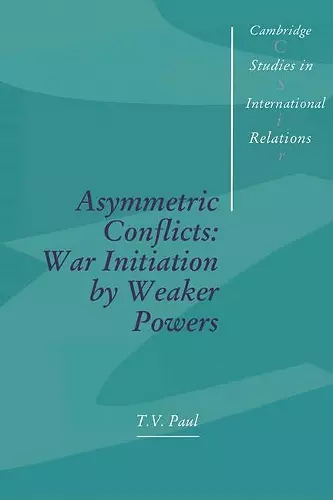Asymmetric Conflicts
War Initiation by Weaker Powers
Format:Hardback
Publisher:Cambridge University Press
Published:10th Mar '94
Currently unavailable, our supplier has not provided us a restock date
This hardback is available in another edition too:
- Paperback£30.99(9780521466219)

This book asks why weaker powers so often engage in wars against stronger opponents.
This book examines a question generally neglected in the study of international relations: why does a militarily and economically less powerful state initiate conflict against a relatively strong state? T. V. Paul analyses this phenomenon by focusing on the strategic and political considerations, domestic and international, which influence a weaker state to initiate war against a more powerful adversary. The key argument of deterrence theory is that the military superiority of the status quo power, coupled with a credible retaliatory threat, will prevent attack by challengers. The author challenges this assumption by examining six twentieth-century asymmetric wars, from the Japanese offensive against Russia in 1904 to the Argentine invasion of the Falkland Islands in 1982. The book's findings have wide implications for the study of war, power, deterrence, coercive diplomacy, strategy, arms races, and alliances.
"...an important contribution to the literature on the causes of war. Students of history and international politics should find the book accessible and provocative. Paul raises an important and timely issue that has received limited attention, and his contribution is certain to spark debate. The book serves as an excellent reminder that conflict processes are often complex and do not lend themselves to easy solutions." Martin Malin, Journal of International Affairs
"...the case studies are well presented, and the argument clearly put." Foreign Affairs
"Asymmetric Conflicts makes a valuable contribution to initiation theory by investigating a puzzling, yet recurring, phenomenon in international politics: the tendency of weak states to initiate war against stronger adversaries....[T]he case studies make a good read; they are structured around a consistent set of theoretically interesting questions and present a sensible understanding of historical events. Moreover, the author has conducted extensive research, including personal interviews with historians and participants....Paul's book studies a familiar question in a fresh light....[B]y bringing together a number of important hypotheses and carefully applying them to a specific set of cases, Paul's work advances our understanding of an issue vital to the study of foreign and security policy." Susan Peterson, Journal of Interdisciplinary History
ISBN: 9780521451178
Dimensions: 235mm x 155mm x 24mm
Weight: 492g
262 pages